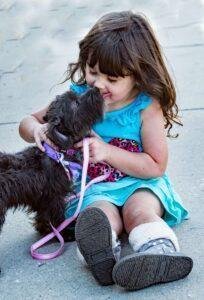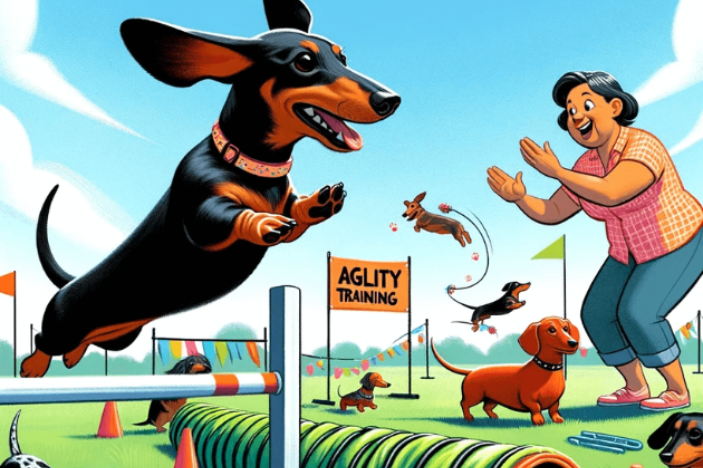do you want to know if are dachshunds good with kids? The answer is yes, Dachshunds can make good family dogs when raised with proper socialization and training, but they may do better in homes with older children who can interact with them gently.
Their long backs and small size mean dachshunds are prone to injury if handled roughly or allowed to jump from furniture, so supervision is crucial when they are around young kids. Additionally, dachshunds were originally bred to hunt badgers and other prey, which means they can exhibit behaviors like nipping, chasing, or aggressiveness around rambunctious children if not properly trained.
However, with early socialization and obedience training, dachshunds can learn good manners and appropriate behavior when living in a home with respectful, dog-savvy children. Their moderate exercise needs also make them a good choice for families who want a dog suited for shorter walks, play sessions or cuddle time rather than intense hiking or running. And their devoted, loyal personalities mean dachshunds often thrive on being close to their family members, including well-behaved children who treat them appropriately.
In general, dachshunds tend to do best in homes with slightly older kids who understand how to gently interact with small dogs. Caution should be taken if considering a dachshund in a home with very young toddlers who may play too roughly and inadvertently harm them. But with proper training and supervision, dachshunds can become loving companions for families with children.
When introducing a dachshund to a baby, it is crucial to prioritize safety. Here are some tips to ensure a positive interaction:
- Supervision: Always supervise interactions between dachshunds and babies. Never leave them alone together, especially when the baby is on the floor or in a high chair.
- Positive socialization: Properly socialize your dachshund from a young age, exposing them to different environments, people, and situations. This can help them become more comfortable and adaptable around babies and children.
- Gentle handling: Teach your baby how to interact with the dachshund gently. Encourage them to pet the dog calmly and avoid pulling on their ears, tail, or fur. Supervise closely to prevent any unintentional harm.
- Boundaries: Establish boundaries for both the dachshund and the baby. Teach the baby to respect the dog’s personal space and avoid disturbing them when they are sleeping or eating.
- Gradual introduction: Gradually introduce the dachshund to the baby by allowing them to sniff and observe from a safe distance. Reward the dachshund for calm behavior and positive interactions.
- Positive reinforcement: Use positive reinforcement techniques to reward the dachshund for calm and gentle behavior around the baby. This can help create a positive association and reinforce good behavior.
By following these guidelines and ensuring a safe and supervised environment, dachshunds can form a loving and nurturing relationship with babies.
Do Dachshunds Love Cuddling?
Dachshunds are an exceptionally cuddly breed that absolutely loves to snuggle up with their owners. Their affectionate personalities and strong bonds with their people make them prone to seeking out cuddles whenever possible. One of the biggest reasons dachshunds love to cuddle is that they were originally bred not just for hunting, but also as companion dogs for various nobles and royal courts.
This means they were selected for their pleasant and engaging temperaments, including enjoyment of close human interaction. Dachshunds also tend to get cold easily due to their short coats and petite bodies, so curling up with their owners is an effective way for them to stay warm and cozy.
The security and comfort that comes from being right next to their trusted humans can also help soothe anxious or timid dachshunds. And of course, snuggle time allows dachshunds to soak up the attention, affection, and petting they crave from their favorite people.
For many dachshunds, their preferred sleeping spot is tucked against their human side or in the crook of their lap. Their strong propensity for bonding, affection, and attachment makes physical closeness a key part of the dachshund’s relationship with their owner.
Dachshunds Watch Over Children
Dachshunds can make loyal and protective companions for families with children, though proper training and supervision are still important.
Here are some of the reasons dachshunds often enjoy watching over kids.
- Pack mentality – With their hunting dog origins, dachshunds have a pack mentality and will see human family members as part of their pack. They may take on the role of watching over the younger members.
- Loyal nature – Dachshunds form very strong bonds with their families, especially the children they are raised with. Their devotion makes them want to keep an eye on the kids.
- Alert personality – Dachshunds tend to be alert and observant, noticing when something is amiss. This translates into paying close attention to the activities of children.
- Courageous spirit – Despite their small size, dachshunds have bold, courageous personalities. This can make them protective of children if they sense any threat.
- Affection for kids – When raised with children, dachshunds often develop great affection for them and enjoy being near the kids as much as possible.
- Guarding instinct – Some dachshunds may show an instinct to guard territory and family members, wanting to watch over the kids in their household.
With proper training to avoid excessive barking or aggression, a dachshund’s loyal, alert, and protective personality can make them a great canine companion for children. Supervision is still advised, but dachshunds often delight in watching over their kids.
What are some tips for interacting with dachshunds and children?
Interactions between dachshunds and children can be joyful and fulfilling, but it’s important to establish guidelines for a safe and harmonious relationship. Here are some tips for interacting with dachshunds and children.
- Supervise all interactions between dachshunds and young children. Dogs and kids should never be left unsupervised.
- Teach children proper manners for safely interacting with dogs – petting gently, not pulling tails or ears, not disturbing a sleeping dog, etc.
- Socialize dachshunds slowly and positively with children from an early age so they learn good experiences.
- Train dachshunds basic obedience commands like “sit” and “stay” so children can also practice giving them direction.
- Prevent dachshunds from jumping up on children, as their backs are prone to injury if they jump off from a child’s arms.
- Do not allow children to walk dachshunds unattended, as they can be prone to back injury if pulled too hard.
- Provide dachshunds with a safe space away from children when they need some alone time. Highly supervise interactions.
- Remind children never to disturb a dachshund that is sleeping or eating, as those can trigger aggressive reactions in any breed.
- Make sure children pet and handle dachshunds gently due to their fragile backs. Do not let them pick up dachshunds.
- Continually reinforce wanted behaviors so good manners become a habit around children.
With training, supervision, and gentle handling, dachshunds and children can develop wonderful bonds and coexist safely. Always focus on positive interactions.
Does Dachshund Love to Play?
yes, Dachshunds typically love to play, especially when given appropriate toys and activities that match their energy level.
Here are some key reasons why dachshunds enjoy playtime:
- Hunting heritage – Dachshunds were bred as hunting dogs, so they often retain a strong prey drive and instinct to chase. Games like fetch help satisfy this innate urge.
- Cleverness – Dachshunds are intelligent dogs, so they need mental stimulation. Interactive toys and puzzles engage their smarts.
- Sociability – Dachshunds are quite social and bond closely with their owners. Playtime is a great chance for shared human-canine enjoyment.
- Moderate energy – While they don’t need marathon runs, dachshunds have a moderate energy level perfect for lively play sessions.
- Positive reinforcement – Playing reinforces positive behaviors for dachshunds as they get praise and rewards during play.
- Preventing boredom – Without adequate activity, dachshunds are prone to boredom and destructive behaviors. Play reduces this risk.
- Good exercise – Play activities like fetching balls or frisbees provide dachshunds with beneficial physical exercise.
Providing a dachshund with plenty of interactive toys, mentally stimulating games, off-leash playtime and activities tailored to their energy needs are great ways to keep this fun-loving breed happily entertained. Playtime taps into their natural instincts in a healthy way.
Dachshunds make great companions
Dachshunds make wonderful companions when trained well. Their happy personalities and strong loyalty to their owners make them very good companion dogs. Dachshunds love people and bond deeply with their families. Although they were bred to hunt, dachshunds are happy in homes as long as they get some daily exercise like short walks.
They are smart and eager to learn when taught with praise and rewards. Well-trained dachshunds can learn to be polite house pets. Dachshunds are known for being very cuddly. They love snuggling up with their owners for belly rubs, pampering, and sharing the couch.
Their protectiveness comes from complete devotion to their humans. With training, dachshunds become watchful but friendly watchdogs. Their lively, fun-loving spirits bring joy wherever they go. With their unique mix of devoted companionship, sweet snuggles, good humor, and family-loving personality, it’s easy to see why trained dachshunds make such excellent canine friends.
Do dachshunds like to be picked up?
Dachshunds, like any dog breed, have individual preferences when it comes to being picked up. While some dachshunds may enjoy being held and cuddled, others may feel uncomfortable or anxious when lifted off the ground. The reaction of a dachshund to being picked up can vary based on their personality, previous experiences, and how they were introduced to being handled from a young age.
It is important to respect the comfort level and boundaries of each dachshund when it comes to being picked up. Pay attention to their body language and cues to determine if they enjoy or tolerate being held. Some dachshunds may show signs of distress, such as struggling, whining, or tensing up when lifted, indicating that they may not enjoy the experience.
If you need to pick up a dachshund, it is recommended to use proper handling techniques to ensure their comfort and safety Support their entire body, especially their back, and avoid putting excessive pressure on their spine. Gentle and secure handling can help create a positive association with being picked up.
How to Pick Up Your Dachshund?
When picking up a Dachshund, it’s important to be mindful of its unique body structure, which includes a long back and short legs.
Here are some steps to safely pick up your Dachshund:
- Approach calmly: Approach your Dachshund calmly and make sure they are aware of your presence before attempting to pick them up. Sudden movements or surprises can startle them.
- Bend down: Lower yourself to your Dachshund’s level by bending your knees, rather than reaching down from a standing position. This helps you maintain stability and avoid straining your back.
- Support the rear end: Place one hand under your Dachshund’s chest, near the front legs, while gently sliding your other hand under their rear end. Be sure to support their rear end to avoid putting strain on their spine.
- Lift with care: Once you have a firm grip on both the chest and rear end, lift your Dachshund slowly and smoothly. Use your leg muscles to lift, rather than your back, to prevent any potential injury.
- Hold securely: Once lifted, make sure to support your Dachshund’s entire body against your chest or cradle them in your arms, keeping their back as level as possible. Avoid letting them hang or dangle unsupported, as this can strain their back.
- Avoid excessive twisting or turning: While holding your Dachshund, be cautious about making sudden or jerky movements. These dogs are prone to back issues, so it’s essential to keep their spine aligned and avoid any unnecessary strain.
Remember, not all Dachshunds enjoy being picked up, so it’s crucial to respect their preferences and body language. If your Dachshund shows signs of discomfort or resistance, it’s best to refrain from picking them up and find alternative ways to interact and bond with them.
Can Dachshunds be Stubborn?
Dachshunds are known for being stubborn dogs. Their strong-willed nature is often a hallmark of the breed. Dachshunds have a reputation for being difficult to train due to their independent thinking and determination. Their stubbornness stems from their hunting roots – dachshunds were bred to fearlessly follow prey into burrows despite any obstacles in their way.
Today, this translates into stubborn behavior like refusing to respond to commands, pulling strongly on leashes, and determinedly following scents. Dachshund owners find they must be patient, consistent, and firm during training to get through to their stubborn pups.
While exasperating at times, the dachshund’s strong will is also a sign of its spirited and tenacious personality. With proper training and socialization, dachshund owners can channel their dog’s stubborn determination into positive traits.
Are male or female dachshunds good for kids?
Both male and female dachshunds can make good pets for families with kids, but there are some differences in temperament on average between the sexes to consider:
- Males tend to be more playful, silly, and outgoing. They often love playing with children and romping around. However, some male dachshunds may be more likely to try to dominate or be aggressive, so early socialization and training are important.
- Females tend to be more independent, reserved, and loyal. They are often very bonded with their family. Females can be protective of children they are close to. However, some female dachshunds can be snippy with small kids if boundaries are not set.
- Both sexes should be supervised closely with very young children. Dachshunds have small bones that are prone to injury if children play too roughly. Their long backs are also prone to disc injuries if picked up wrong.
- For families with older, gentle kids, dachshunds of both sexes can do well. Early socialization to children is key no matter the sex. Obedience training is also important to manage any stubborn tendencies.
Overall, dachshunds’ outgoing yet protective temperaments allow them to thrive as family dogs. Training and supervision are key to nurturing good relationships between dachshunds and kids. Either sex can work well in homes with proper care and handling.
Are Dachshunds good for first-time owners?
Dachshunds can be suitable for first-time owners, but it’s important to understand the breed’s unique characteristics and needs before making a decision. Dachshunds are intelligent, loyal, and affectionate dogs, which can make them wonderful companions. However, they also possess some traits that may present challenges for inexperienced owners.
Dachshunds can be stubborn at times and require consistent training and socialization from an early age. Their independent nature means they may not always be obedient or easily trainable, which can be a learning curve for first-time owners. Patience, positive reinforcement, and a firm yet gentle approach to training are key.
Additionally, dachshunds have a moderate energy level and need regular exercise to stay physically and mentally stimulated. They also require mental enrichment to prevent boredom, which can lead to destructive behaviors. First-time owners should be prepared to provide them with daily exercise and interactive playtime.
Grooming needs for dachshunds are relatively low, with their short coats requiring minimal maintenance. However, their long backs make them prone to spinal issues and back problems, so it’s important to handle them carefully and avoid activities that put a strain on their backs.
Overall, with proper preparation, commitment to training, and an understanding of their specific needs, dachshunds can be a rewarding choice for first-time owners. Seeking guidance from experienced dog owners or trainers and dedicating time and effort to their care and well-being can help ensure a successful and fulfilling relationship with a dachshund.
What makes dachshunds suitable for children?
Dachshunds can be playful companions, teach responsibility, and promote physical activity with kids.
Do dachshunds require supervision around children?
Yes, it is crucial to supervise interactions between dachshunds and children to ensure safety and proper handling.
Can dachshunds be possessive or jealous around kids?
Like any dog, dachshunds may exhibit possessive or jealous behaviors. Early training and socialization can help mitigate such tendencies.
What precautions should be taken when introducing dachshunds to kids?
Gradual introductions, gentle handling, and teaching kids to respect boundaries are essential when introducing dachshunds to children.
Conclusion
Dachshunds can make excellent family dogs when properly trained and socialized around children. Their playful, devoted temperaments allow them to form close bonds with kids. However, their small size means young children should be supervised during play to avoid injuries. Additionally, dachshunds’ stubborn streaks mean they require firm, positive training to learn good manners around kids.
Setting boundaries and teaching children how to gently interact builds a safe, affectionate relationship between kids and dachshunds. While their long backs make them prone to injuries when mishandled, teaching kids to pet, cuddle and play carefully minimizes risks.
Overall, dachshunds can thrive in homes with children of all ages when care is taken to nurture the relationship through training, supervision, and education about safe handling. With preparation and care, the dachshund’s loyalty and fun-loving nature can make it an ideal dog for families.






